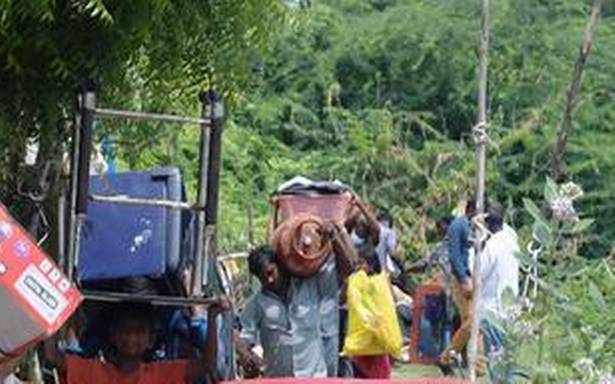Activists seek wider consultation to address gaps in draft resettlement policy
Around 15 non-governmental organisations, community representatives and academicians have appealed for a moratorium on evictions until the State government finalises the proposed resettlement and rehabilitation (RR) policy.
During a consultation on the draft RR policy organised by the Madras School of Social Work and the Information and Resource Centre for the Deprived Urban Communities on Wednesday, they demanded wider consultation on the draft policy and addressing several gaps in the draft. They urged the Tamil Nadu Urban Habitat Development Board to extend the last date (October 27) given for providing feedback as the Tamil version of the draft was made available only on Saturday.
Citing the recent constitution of a drafting committee and wider consultation with civil society organised for drafting the State policy for women, they said that a similar approach should be followed by the government for the RR policy as well.
The participants stressed that the RR policy could not be finalised in a hurry while the drafting of a housing policy was under way.
While welcoming the State Government’s move to bring in such a policy, they offered a number of suggestions to address gaps in the draft. A common observation made by many participants was the need for clarity and clearer definition on several aspects.
Arguing that any such policy should first identify the existing problems and then talk about how it planned to address them, Karen Coelho, associate professor, Madras Institute of Development Studies, said the existing issues were not articulated in the draft RR policy.
The definition that the resettlement site should be within 30 minutes of travelling time of the nearest urban centre could have different interpretations, she said.
Many participants said it should rather be defined in terms of distance from the place where the people were residing before relocation.
Vanessa Peter, founder, Information and Resource Centre for the Deprived Urban Communities (IRCDUC), highlighted the inadequate representation of civil society and community representatives in the composition of committees suggested in the policy.
J. Sebastin, coordinator of the Tamil Nadu Slum Clearance Board Residents’ Welfare Committee, said the draft policy did not speak about transfer of ownership of houses to the resettled population.
Andrew Sesuraj, convener, Tamil Nadu Child Rights Watch, said the policy should clearly say that resettlements would not be done in the middle of an academic year as it would affect the children.
Other key suggestions raised during the consultation revolved around limiting the size of the resettlement colonies, addressing safety aspects that was a key concern at present in these colonies, efficient grievance redress mechanisms, and better and broader definitions on facilities to be provided at the resettlement sites.
Source: Read Full Article

